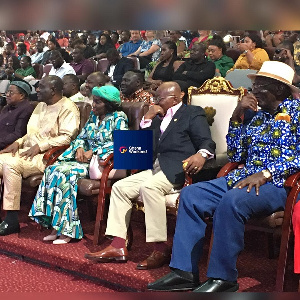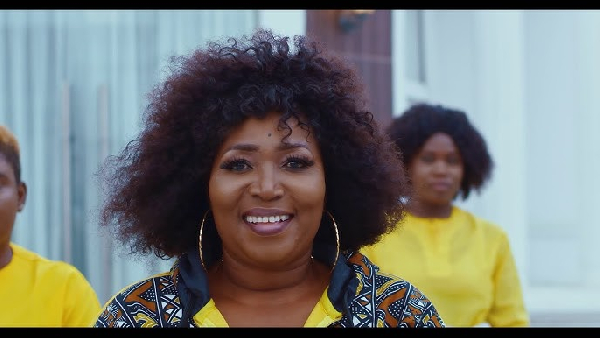Why Male-Ghana does not care about Serwaa Amihere

In recent weeks, there has been exceptional public interest in the leaked private film of Serwaa Amihere, Ghana’s most prominent female journalist.
From online blogs to TikTok, Facebook and Instagram posts, print and online media, the person reporting the story as a journalist has unfortunately become the narrative.
Misogyny
Misogyny is defined as a hate of, contempt for, or innate prejudice toward women.
When reading and watching “The Man Who Shall Not Be Named’s” repeated reflections and posts as a result of his despicable act of purportedly leaking the tape; one wonders if he is secretly rejoicing in his 5 minutes of fame.
Revelling not just because of the attention, but also because he, like other men who make their money quickly and are not known for any specific talent, depth, maturity, or professional or financial acumen, adored Serwaa’s appearance but was possibly entirely jealous of how she had moved on from him.
Whether you like her or not, Serwaa is successful, poised, and has interviewed Ghana’s most prominent personalities. She has achieved not only national credibility but also popular recognition and numerous endorsements. She was a TV force to be reckoned with and possibly just getting started as a real journalist, until “his” juvenile and nasty act of revealing what she may or may not have shared personally with “him” to the world.
The misogynistic jealousy in that rake of a man may, in a broader sense, be extended to male Ghana, who may collectively (though not all of them) be laughing at the misfortune of a professional woman who defies the general grain of conservative Ghana by being outspoken, confident, overdressed, and appearing feminist.
This is, after all, a society where, upon learning of the film’s existence a few months ago, countless men around the country would wake up and refresh the feed on their phones to see whether the footage had indeed been dropped.
A country where men would shake the hand of such a woman at a gathering but would never consider marrying someone brighter than themselves. A country where, if you scratch the surface of what people are feeling in general about this woman, there is a collective sigh of “this is what happens when you are too known and out there as a woman” and “this is what happens when you prioritize profession, clothes, handbags, and becoming the top of your field; (allegedly) unmarried and childless.” It is also an oblique warning to women not to tread the same road should they suffer the same fate.
Is it the government’s responsibility to bring a case against the accused?
And if you don’t believe male Ghanaians and even Serwaa’s journalistic fraternity are jealous of her popularity (possibly because they wrongly suspect she climbed the ranks to the top in the fast lane) and comforting themselves in her misfortune, consider why everyone is asking whether it is the government’s responsibility to bring a case against the accused in this matter.
If someone steals 10 hens in Northern Ghana and the owner makes a police report, the police will investigate the facts in light of anti-theft statutes and decide whether to prosecute the case in criminal court. The court hearing the case may then imprison the perpetrator, as has been done in the past, for ten chickens.
When an unknown 12-year-old girl in Ghana marries a considerably older man, resulting in negative local and international attention to such an illegal act, the present Attorney General issues a statement stating that after a thorough investigation, the state may take the matter up.
Both victims are not well-known, but our country is concerned about whether the government has the right to “waste its time” pursuing this case on Serwaa’s behalf.
Laws
As a lawyer, I believe:
1. The state’s case against the accused is legal. Especially given the state’s case filed on April 8, 2024, is a charge sheet and facts for prosecution based on CRIMINAL offenses: –
Under the Cybersecurity Act 2020 (1038)
Conspiracy to conduct crime by non-consensual sharing of personal photos, which violates sections 23(1) of the Criminal Offences Act 1960 (Act 29) and 67(1)(2) of the Cybersecurity Act 2020 (Act 1038).
Non-consensual sharing of intimate images violates section 67(1) of the Cyber Security Act 2020 Act 1038.
Sexual extortion violates Section 66(1) of the Cyber Security Act 2020, Act 1039.
2. Only the state can file a criminal complaint, not private individuals. The individual provides a witness statement to the police, who then utilize it to evaluate whether a prima facie case exists and, if so, under what law. The state had every right to bring this case.
3. Furthermore, The Attorney General’s department exists (in part) to push policy and there is no higher policy right now than policy against “revenge porn” or “the public sharing of a private indecent video” being the centre of conversation in Ghana for April 2024.
So, if lawmakers see the conversation this case is sparking and we have laws against such acts, and the successful prosecution of such a case sends a message to ALL young and old men not to do the same thing–then the government wins in terms of enforcing the law and implementing an effective policy that sticks in the minds of a male generation not to repeat such acts or face jail time.
4. I recommend Serwaa’s lawyers take two further steps against the accused: seek an ex parte injunction to prevent “him” from speaking publicly about the case until it is resolved in court (especially since she hasn’t opened the door to public commentary) and seek damages in civil court for $1 million for the extensive damage to her reputation.
If “he” has no more money, go after his properties and, if she obtains orders on them, give them to an NGO or shelter domestic abuse victims to demonstrate to the public that it is not about the money. It’s about giving a woman a choice over her image and whether she wants to share private footage publicly. She did not choose to have anyone publish that tape in public, and because he allegedly attempted to take away her profession, dignity, and credibility, she can (if she so desires) financially punish him.
It also sends a message to other males who wish to do this against their fellow Ghanaians not to do so lest they lose money or end up in jail for 5 years, which is highly possible in this case. Even if she privately shared the footage with him.
What reputation did Serwaa have before the video
Some may ask themselves, after reading my last paragraph, “What reputation did she have before this?” Well, that is up to the judge in a civil court to decide whether her lawyers should file. The judge will consider reasons such as the cost of that video to Serwaa, particularly if it leads to:-
1. Serwaa being replaced as the face of morning TV in Ghana
2. Serwaa loses her lucrative sponsorship deals
3. Serwaa struggles to secure journalistic positions at the same or better level due to reputational damage
4. It has an impact on Serwaa’s private life now and in the future, as objectively assessed.
5. Serwaa faces public scorn, which she can demonstrate to the judge
After the incident in question, “The one who shall not be named” posted an image of himself cradling two girls under the age of six, figuratively “lifting the girl-child” while also threatening any woman in this country who dares to support Serwaa (and he happens to know) with leaking their footage if they continue to defend her.
If that’s not misogyny, I’m not sure what is. And if this isn’t an opportunity for the government to follow through on its laws safeguarding women from such intrusions into their private lives, I don’t know what is.
The new face of victimizing women
Domestic violence is one of the traditional forms of victimizing women. The new face of victimizing women is more subtle, dangerous, harmful, and public, such as disclosing naked pictures and films to the world without a woman’s agreement to do so.
The face of victimizing women has evolved so much that countries such as the United Kingdom have had to pass legislation stating that domestic abuse toward a partner includes psychological as well as physical acts, and psychological abuse is a criminal offense for which an accused can face jail time if sentenced.
Women are no longer only targeted in traditional ways, such as domestic violence because studies show that males know they might go to jail for domestic violence, so they have adopted additional psychological tactics that are so destructive that some women even wish to commit suicide.
The new reality of victimizing women involves revenge pornography and distributing naked images and films, which can lead to suicide.
The only way it appears to go is what the current government is doing: putting their policy where their laws are by hopefully making an example of “him” to the point where the entire Ghana, when a man even thinks of sharing such pictures and videos without the express consent of a woman (even if she shared it privately with him), will not share them and think that “he” went to jail for 5 years and the smile was wiped off his face.
Columnist: Amanda Clinton





